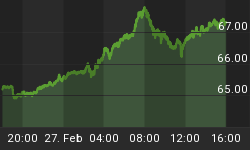Weekly Recap of the Metals, Energy, Grains, Meats, and Softs Markets
Energy
Crude oil fell more than 12-percent this week, with the November contract sliding $13.01 to settle at $93.88 a barrel. Concerns that weakening economic data will result in further demand destruction, combined with strength in the U.S. dollar set the stage for an ugly week in oil.
The Commerce Department reported a steep decline of 4-percent in factory orders for August, well above the 2.5-percent drop analysts expected. August marked the largest decline since falling 4.8-percent in October of 2006.
On Thursday, The Labor Department reported that initial jobless claims increased by 1,000 climbing to a seasonally adjusted 497,000, considerably above analyst expectations of 475,000. Jobless claims reached the highest level since just after the terrorist attacks on Sept. 11 seven years ago.
The EIA reported that U.S. inventories of crude oil rose 4.28 million barrels to 294.5 million last week, well above analysts 2.5 million barrel estimate. Refinery utilization increased 5.6-percent to 72.3-percent after storms reduced supplies last month.
Natural gas futures fell 3.5-percent on the week, with the November contract settling at $7.358 a million British thermal units. A larger than expected build of inventories, combined with overall commodity weakness was noted for the decline.
The U.S. Energy Information Administration reported a build of 87 billion cubic feet of natural gas last week, well above the 78 bcf injection analysts were anticipating.
November reformulated gasoline closed at $2.2283 a gallon, and November heating oil settled at $2.662 a gallon.
Grains
Soybeans fell 15-percent on the week, with the November contract settling $1.72 lower at $9.92 a bushel. Falling export sales and estimates for soybean supplies to grow more than projected earlier by analysts helped send soybeans to the lowest level in 11-months.
Soybean stocks in the fourth quarter of the 2007-08 were estimated at 205 million bushels as of Sept. 1, the USDA reported. The number came in well above the analyst expectations for 144 million bushels with a 140 million bushel carry out.
U.S. export sales of soybeans came in at 471,000 metric tons in the week ended Sept. 25, down 23-percent from the previous week, the USDA reported this week.
Corn collapsed the most in over 20-years, with the December contract settling the week 89 cents lower at $4.54 a bushel. Falling energy prices, rising value of the dollar, and higher inventory data helped send corn 20-percent lower on the week.
Corn inventories in the U.S. as of Sept. 1 were pegged at 1.624 billion bushels, reported the U.S. Department of Agriculture. Analysts were expecting a fall of 1.539 billion. The USDA also predicted a 14-percent decline in demand for corn feed.
Wheat fell 12-percent on the week, with the December contract settling 78 cents lower at 640 1/4 a bushel. Fund liquidations, and pressure from the global equity markets was noted for some of the decline on the week.
Metals
Gold closed the week 7-percent lower, with the December contract shedding $59.60 at $828.90 an ounce. Gold started the week higher as a flight to safety before the falling energy markets, and the strength in the U.S. dollar gave the bears more ammo. December silver settled the week $2.15 lower at $11.36 an ounce.
The U.S. Senate and House approval of the $700 billion bailout plan sent the dollar significantly higher, reducing the appeal of precious metals as a flight-to-safety. The U.S. dollar climbed to the highest level in 13-months this week.
Copper was slammed by 14-percent this week, with the December contract settling over 38 cents lower at $2.69 a pound. Lower housing and auto sales have sent base metals in a tailspin. Copper is at an 18-month low, and platinum and palladium, that is used in new cars, are down over a third on the year.
The U.S. governments existing home sales report showed sales of previously owned homes crumbled more than expected last month in the U.S., with the median price sliding the most on record.
Softs
Coffee fell to a fresh yearly low, with the December contract settling 12 cents lower on the week at $1.2205 a pound. Rising inventories, a slowdown in the global economy, and a rise in the value of the U.S. dollar was noted for much of 10-percent loss for the week.
U.S. coffee inventories have climbed 2.3-percent to 4.57 million bags. Brazil, the world's largest grower of the bean, is expected to harvest 51.1 million bags this year, well above last years 37.6 million, the U.S. Department of Agriculture forecasted.
Cotton closed 8-percent lower on the week, settling at 57.41 cents a pound. Huge inventories and spill-over pressure from the falling grain market was noted for December hitting a fresh contract-low.
Cocoa settled the week 11-percent lower with the December contract closing at 2469 a metric ton. November orange juice settled the week 10-percent lower at 82.10 cents a pound.
Meats
Cattle settled the week about 5-percent lower, with October feeder cattle losing just over a nickel at 100.67 cents a pound. Concerns that cash strapped consumers will rotate into cheaper proteins continues to weigh on market sentiment. October live cattle sank to a fresh contract low settling at 95.60 cents a pound.
The U.S. Department of Agriculture's midday beef wire for Friday showed choice cuts were $0.80 per hundredweight lower, while select items fell by $0.15 per hundredweight.
Hog futures closed the week moderately lower, with October lean hogs falling 320 points at 66.42 cents a pound. Fund liquidation continues to weigh on prices. February pork bellies fell 390 points on the week, settling 94.10 cents a pound.















